
Conectados al Sur: Chile
2016. Digitally Connected
The Institute of Communication and Image at the University of Chile, UNICEF, and the Berkman Center for Internet & Society co-hosted the second regional symposium “Conectados al Sur: Chile” on children, youth, and digital media at Urban Station’s Telefonica Open Future office in Santiago (Chile) on May 12-13, 2016, to map and explore the state of relevant research and practice at the national, regional, and international levels, share and discuss insights and ideas across countries, and encourage collaboration between participants.
The symposium focussed on the use and adaptation of the Internet by traditionally marginalized youth across Latin America and the Caribbean in order to increase the inclusion of these groups online. These vulnerable communities include, but are not limited to, youth in rural areas, LGBTQ youth, ethnic and racial minorities, youth with disabilities, and girls and young women.
Against this backdrop, the symposium addressed both challenges and opportunities youth face in the digital environment, including (but not limited to) issues such as inequitable access, risks to safety (e.g. cyberbullying) and privacy, hate speech and social exclusion, youth rights and empowerment, skills and digital literacy, spaces for participation and civic engagement and innovation, and the role of the Internet in strengthening relationships, and sense of belonging.
Bringing together 100 academics, practitioners, young people, civil society, activists, philanthropists, government officials, and representatives of technology companies from primarily Latin America and the Caribbean, this interactive, participatory event builds upon a multi-year collaboration between the Berkman Center’s Youth and Media project and UNICEF’s Voices of Youth initiative.
Regional & Global Context
The symposium was embedded in a larger context and seeked to contribute to a broader debate about children’s and young people’s right in increasingly digitally connected societies. A variety of stakeholders across the globe are investing in digital infrastructures and promoting the transition towards the digital economy. It is critically important that these investments also take into account the needs of youth, and include measures that provide youth with access to digital tools and the Internet, as well as the necessary skills and literacies to use it to their benefit.
Amidst the growth in Internet penetration and adoption among youth in Latin America and as the pace of development of digital technology accelerates, it is essential to bridge existing divides in order to ensure that the most vulnerable youth are not left behind. As more and more children are connected to each other through the Internet and mobile technologies, it is imperative to ensure that they have safe access to these technologies’ beneficial resources without being harmed.
Key Objectives
Within the contours of this broader context, this conference seeked to build upon both the conclusions of the first Conectados al Sur symposium in Argentina, and a series of conversations with Latin American and Caribbean academics and practitioners. To further these ideas, this symposium seeked to:
- Promote understanding about the use and adaptation of the Internet by traditionally marginalized youth in order to increase the inclusion of these groups online. These communities include, but are not limited to, youth inrural areas, LGBTQ youth, ethnic and racial minorities, youth with disabilities, and girls and young women.
- Map and evaluate our knowledge base on children, youth, and digital media regionally with respect to core topics and issues, and identify potential knowledge gaps.
- Discuss the degree to which theory and practice coincide throughout the region.
- Foster increased sharing between researchers, educators, policymakers, and the public at large in order to devise optimal approaches to handling the challenges and opportunities digital technologies present children and youth.
- Contribute to network- and capacity building by facilitating collaboration among the participating organizations and individuals, with a particular emphasis on cross-country and cross-cultural bridge-building.
The overarching objectives mentioned above guided the agenda, which was developed by the symposium organizers in close collaboration with the co-organizers from the previous symposium in Buenos Aires.
Thematic Tracks
The symposium consisted of three thematic tracks, each of which was further broken down into a number of sessions that zoom-in on specific topics, issues, or ideas. Each session was designed to engage a diverse group of participants, enable insightful conversations, and encourage collaboration. The three thematic tracks were the following:
- Knowledge base: Mapping and discussing the regional state of research and practice. What do we know about children, youth, and the use of digital technologies from a national, regional, and global perspective? What do we know about the adaptation of the Internet by traditionally marginalized youth? What is the state of research and practice, and where are knowledge gaps? What are common findings and experiences across cultures and countries, where do we see differences, and why? Participants will both present insights from research projects and share lessons from practice in order to build a common foundation and work towards a regional and global knowledge base.
- Applications: Sharing and exploring use cases from different communities and geographic areas to demonstrate both the promise and the limitations of digital technologies for children and youth in a given context. What are case studies, experiments, and initiatives that demonstrate the promise of digital technologies for children and youth? What are their limitations? What are powerful narratives, innovative youth-driven programs, and ideas for future engagement? What are exciting projects empowering youth in rural areas, LGBTQ youth, ethnic and racial minorities, youth with disabilities, and girls and young women?What is the most innovative on-the-ground work informed by practice or research around youth and digital media? What can we learn from these stories? How do these success stories relate to failures? Leveraging the collective knowledge of the participants, the symposium will not only discuss findings from research and address policy issues, but explore experimental practices that look at research and the application of knowledge through novel methods, such as youth innovation labs, maker spaces, and digital hubs that are often led by young people who are taking part in hackathons, learning to code, and incubating ideas.
- Interface design: Discussing ways to improve the information flow between experts, decision-makers, and the civil society. What can we learn from each other about the design of interfaces between researchers and other stakeholders in the field? How can we improve our working together? What are our experiences with evidence-based policy-making across cultures and regions? How can the research community be more receptive to the needs of core constituencies, such as decision-makers (e.g. civil society, governments, companies)? What are points of intervention and tools in our collective toolbox to improve the status quo?



